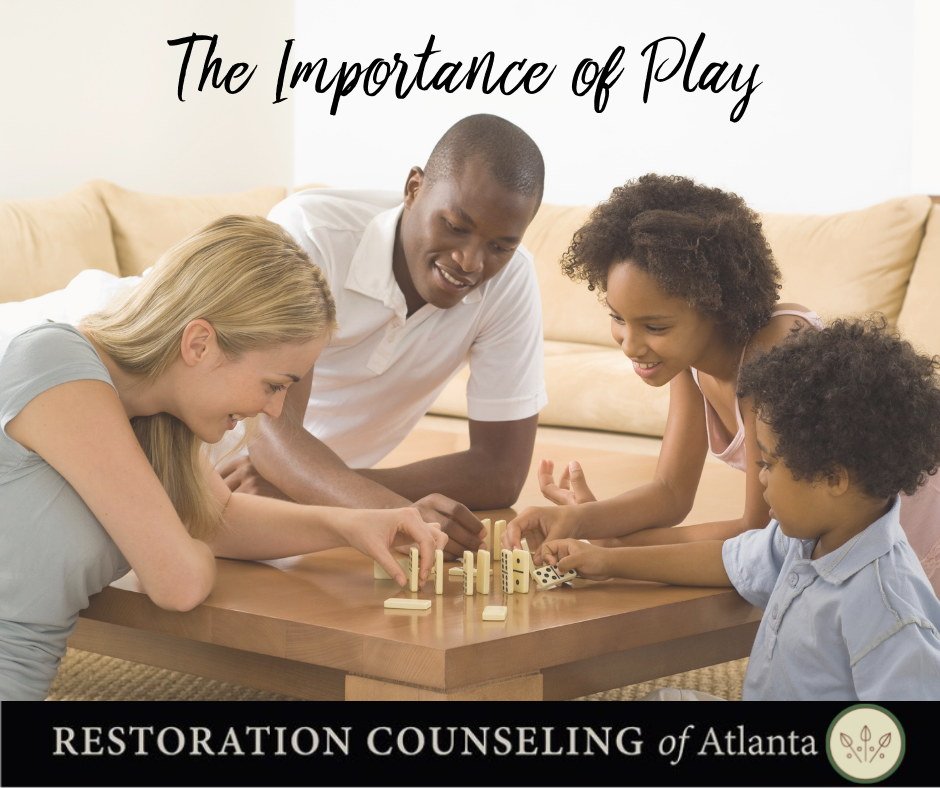A Spoon Full of Sugar – How Play Positively Impacts Our Relationships & Our Mental Health
A cheerful heart is good medicine, but a crushed spirit dries up the bones – Proverbs 17:22
We know that play is essential to a child’s well-being, but do you know that play is also important for teenagers and adults? When a child plays, they learn and make sense of the world around them. Having fun enhances their development as they build physical, mental, social, and emotional skills. The influence of play extends past early learning and is critical for building up a child’s mental health – and guess what? It’s good for you too!
The Science of Play
The experience of being playful boosts positive emotions but is short-lived, so people assume these emotions are trivial. However, scientists such as Barbara Fredrickson and Sonja Lyubomirsky have revealed that positive emotions connected to playful activity can reduce cardiovascular stress and other physical symptoms of stress, increase productivity and creativity, as well as provide a “psychological timeout” from stress. It isn’t just a timeout from stress but a protective barrier for later stressful events. It seems a spoon full of sugar truly does make the medicine go down!
Neurologically, playful activity promotes bonding between parents and children, as well as in romantic relationships and friendships. As people engage in playful experiences, they create neurological connections between pleasure and the person. Positive, playful experiences, in general, seem to trigger “upward spirals” of positive experiences. As we experience a playful positive emotion, it sets a precedent for further positive and productive experiences, which leads to more relational engagement and personal enjoyment in life.
Incorporating Play in Daily Life
First, include positive and playful interaction in a way that feels comfortable to you. For example, if you are not constantly cracking jokes – it’s okay! Think about your strengths. Do you play games well? Do you enjoy cooking or the outdoors? Are you a great conversation starter, an animal lover, or a sports enthusiast? When we lean into what we already do well and enjoy – our tasks will feel easier and doable.
Benjamin Franklin said, “Happiness consists more in small conveniences or pleasures that occur every day than in great pieces of good fortune that happen but seldom.” It is the small moments of pleasure, rather than the few grand experiences, that seem to make a difference in the amount of happiness we feel. In other words, it doesn’t have to take a lot of time or effort to create an impact!
Play with Children
Playing with children helps strengthen relationships between you and your child. If you can’t stomach imaginary play, try playing a game or limiting imaginary play to 15 minutes. Kids who play regularly with their parents are less likely to develop mental health struggles such as anxiety and depression. Additionally, as your child’s play partner, you are laying a pathway for the development of social skills such as taking turns, sharing, and learning about how to act with another person. For busy parents, playing can feel like an added burden, so set a timer for a 15-minute activity where you are NOT acting like a parent or a teacher. Just be present with your child. Research shows us that when a play period is a regular activity with children, there are fewer behavioral and emotional struggles and attention-seeking behaviors in the long run.
Play with Teens
While young children play effortlessly, playing with tweens and teens can feel tricky and yet, no less important. As children age, imaginative play lessens, and games become more organized. If your child is oriented toward sports, you can use sports as an opportunity to connect and reduce stress. However, this is NOT the time to coach and put pressure on a child’s athletic pursuits. It is a time to have fun! Hint: if your child isn’t smiling and you are teaching, lecturing, or coaching, it’s not playing! Put the teaching on pause – think how you would act if this were a friend and not your child. Other ways to interact playfully can be through video games, taking funny pictures together, sending funny videos, cooking, or taking them somewhere where their friends are not likely to run into them. Take time to get to know your child’s interests. When teenagers see that your interaction is not a ploy to lecture them on something they need to change, they will become more engaged.
Play in Adults and Couples
When a couple first begins dating and marries, there is usually a significant amount of time spent engaging in fun activities. That playful spark often gets put on hold as we experience long work hours, have children, and have a household to run. Playing together results in considerable benefits such as improved communication, higher relationship satisfaction, improved sexual interest, and elevated bonding. With individual adults, whether single or in a relationship, play neurologically reduces the impact of stress on our emotional, social, and physical well-being, leading to a healthier and more satisfying life.
What is enjoyable for us varies from person to person, so begin by identifying what brings joy to you or what brought joy to you as a couple early in your relationship. Recognize the common barriers to playing and problem-solve to make it a priority. Create time for moments of pleasure, remembering that small moments add up and build up over time. Press pause on the task or the conflict to joke around, go for a walk, enjoy a funny video, play a game, get active, and be open to trying something new. Ask yourself what’s getting in your way of play. What can you let go for now so that you can feel happier and healthier in the long run?
 Written by Lauren Hamrick, MS, EdS, LPC, RPT, CPCS
Written by Lauren Hamrick, MS, EdS, LPC, RPT, CPCS
lauren@restorationcounselingatl.com
Roswell Location
Lauren is an active, educationally focused therapist who enjoys using both evidence-based and out-of-the-box approaches with children and adults. Lauren is also a registered play therapist. She listens to the interests, knowledge, and experience of her clients and incorporates them into her therapeutic approaches. Areas of focus include career-related stress, anxiety, PTSD, young adult issues, life transitions, abuse recovery, parenting, and family therapy. Lauren also enjoys working with couples who are dealing with parenting issues or are empty nesters.

